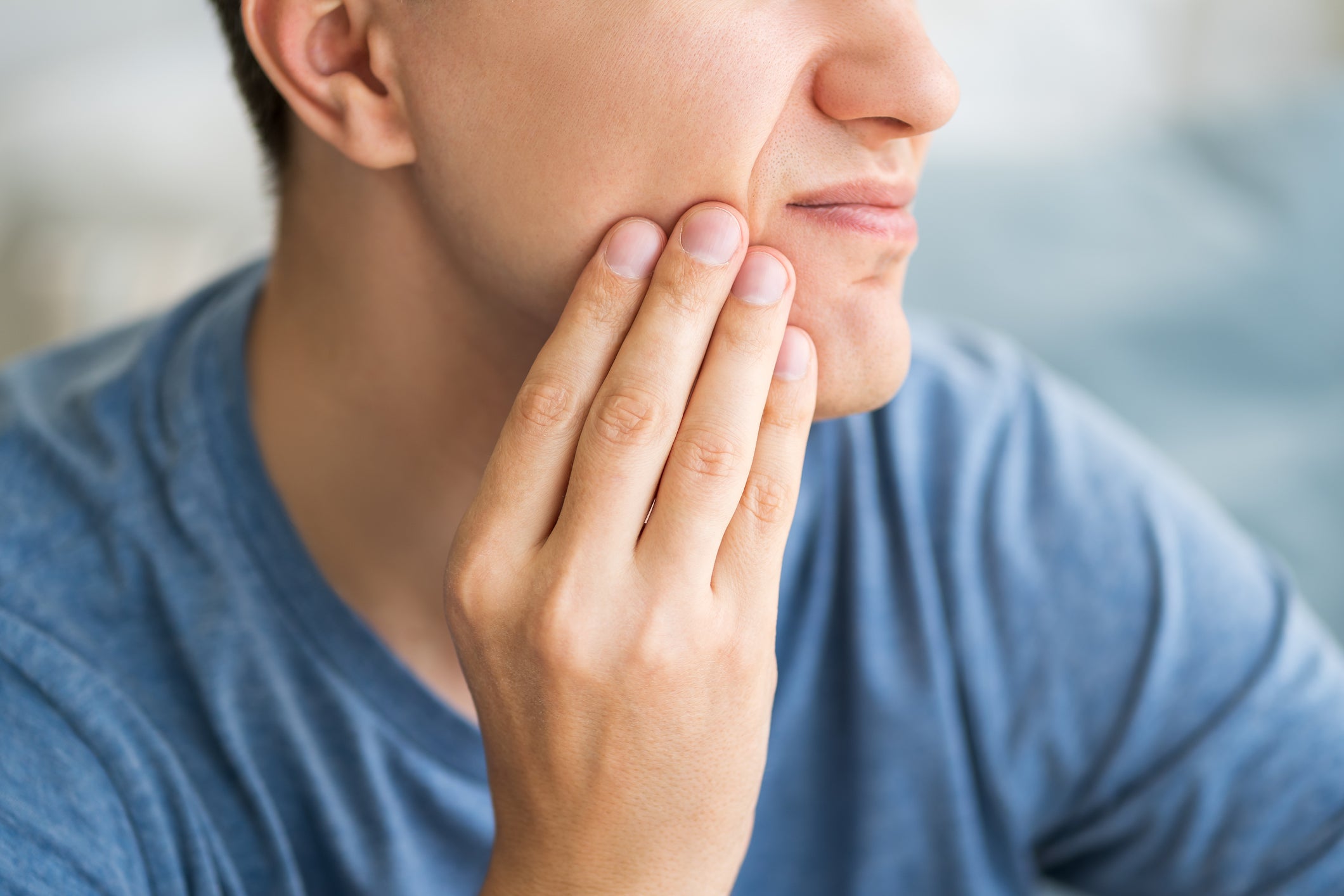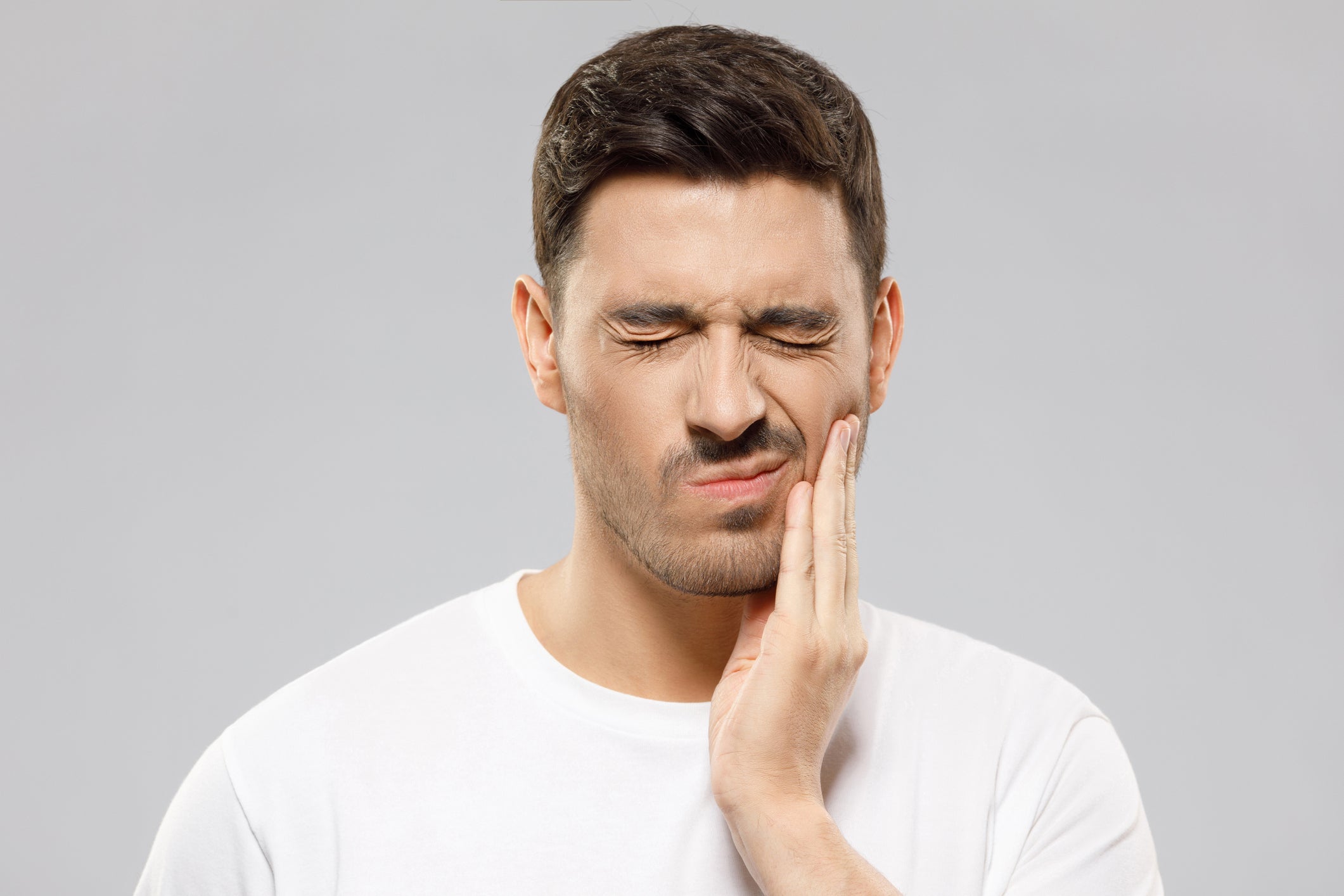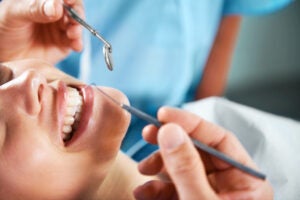-
Why Your Gums Itch

You know that feeling when your gums start to itch? The sensation can be annoying, and it might even make you a little self-conscious. But did you know that gum itchiness is actually a sign of something else going on in your mouth? There are a few different things that can cause your gums to itch. Read on to learn more about common causes of itchy gums and what you can do about it!
What Causes Gums to Itch and What Are Symptoms?
The most common cause of itchy gums is plaque build-up. Plaque is a sticky film of bacteria that forms on your teeth and gums. When plaque isn’t removed, it can harden into tartar. Tartar can irritate your gums and cause them to itch. Other causes of itchy gums include:
- Gum disease – Gum disease is an infection of the gum tissue. It can cause swelling, redness, and bleeding of the gums.
- Allergies – Allergies to food, medication, or other substances can cause itching and swelling of the gums.
- Dry mouth – Dry mouth can occur due to certain medications, medical conditions, or treatments. It can cause the gums to become irritated and itch.
Symptoms of itchy gums include:
- itching
- redness
- swelling
- tenderness
- bleeding
Are Itchy Gums a Warning Sign for a More Serious Issue?
Itchy gums are usually not a sign of a more serious condition. However, in rare cases, they may be a sign of gum disease or another oral health problem. If you have any concerns, see your dentist or oral healthcare provider.
What Are My Options for Treatment and Relief?
The best way to treat itchy gums is to remove the plaque and tartar with professional dental cleanings. Your dentist or oral healthcare provider can also recommend other treatments, such as:
- Fluoride mouth rinse – This can help prevent plaque build-up.
- Soft toothbrush – A soft-bristled toothbrush can be less irritating to your gums.
- Medications – If your itchy gums are caused by an allergy, your doctor may prescribe medication.
When Should I See a Doctor for My Itching Gums?
You should see a dentist or oral healthcare provider if your itchy gums are severe or don’t improve with home treatment. You should also see a healthcare provider if you have any other symptoms, such as:
- fever
- swelling of the face or lips
- difficulty breathing
How Can I Prevent Itchy Gums?
You can help prevent itchy gums by practicing good oral hygiene. This includes brushing your teeth twice a day, flossing daily, and using a fluoride mouth rinse. You should also see your dentist regularly for professional dental cleanings and check-ups.
How Can Park 56 Dental in NYC Help Me Treat My Itchy Gums?
If you have itchy gums, the team at Park 56 Dental in New York can help. We offer professional dental cleanings and a variety of other treatments to help relieve your symptoms. We also offer preventative care services to help you avoid itchy gums in the future. To learn more, contact us today or schedule an appointment online.
-
How to Avoid Dental Abscesses

Dental abscesses are one of the most painful conditions that can affect your teeth and gums. If you think you may have a dental abscess, it’s important to see a dentist right away so that the infection can be treated and the pain relieved. Read on to learn more about dental abscesses and what to do.
What Are Dental Abscesses?
A dental abscess is an infection that can occur around the teeth and gums. This infection is often the result of bacteria that enters the mouth through a tooth or gum injury. The bacteria then multiply and cause an abscess, which is a pus-filled pocket that forms at the site of the infection.
Dental abscesses can be extremely painful and may require treatment by a dentist or other medical professional. If left untreated, dental abscesses can lead to serious health complications such as sepsis (a potentially life-threatening condition caused by infection).
What Are the Symptoms of Dental Abscesses?
The symptoms of dental abscesses can vary depending on where the infection is located. The most common symptom of a dental abscess is severe pain. This pain is often described as throbbing or pulsating and may be worse when lying down or when pressure is applied to the affected tooth. Other symptoms of a dental abscess include:
- Swelling in the face, jaw, or neck
- Redness in the mouth or on the skin around the mouth
- Sensitivity to hot or cold temperatures
- Bad breath
- Fever
How Are Dental Abscesses Diagnosed?
If you think you might have a dental abscess, it is important to see a dentist right away. Your dentist will ask about your symptoms and medical history. They will then examine your mouth, teeth, and gums. X-rays may be taken to confirm the diagnosis.
How Are Dental Abscesses Caused?
Dental abscesses are usually caused by bacteria that enters the tooth through a crack or cavity. Once the bacteria gets inside, it can start to multiply and cause an infection.
What Are the Risks of Abscesses?
If left untreated, dental abscesses can lead to more serious health problems such as: sepsis (a blood infection), meningitis (an infection of the brain and spinal cord), and even death.
How Can I Prevent Dental Abscesses?
Dental abscesses can be painful and dangerous, so it’s important to take steps to avoid them. Park 56 Dental in New York City offers the following tips:
- Brush and floss regularly. This helps remove plaque and bacteria from your teeth and gums, which can lead to an infection.
- See your dentist regularly for checkups and cleanings. This allows your dentist to spot any problems early and take steps to prevent an infection.
- If you have a toothache, don’t wait to see a dentist. This could be a sign of an infection.
- If you have an injury to your mouth, see a dentist right away. An injury can lead to an infection if not treated properly.
- Eat a healthy diet. This helps keep your immune system strong, which can help fight off infection.
How Can Park 56 Dental in NYC Help Treat my Dental Abscess?
The treatment for a dental abscess will depend on the severity of the infection. In some cases, the abscess may need to be drained by a dentist or other medical professional. The pus that is drained from the abscess will usually contain bacteria, so it is important that the area is cleaned thoroughly to prevent the infection from spreading. In some cases, antibiotics may be prescribed to help clear the infection. In some cases, they may also need to perform a root canal procedure to remove the infected tooth. If the abscess is large or does not respond to treatment, surgery may be necessary.
If you think you may have a dental abscess, don’t wait to get it treated. Call Park 56 Dental today at (646) 679-3989 to schedule an appointment.
-
How a Natural Sweetener Can Help with Your Teeth

If you’re looking for a way to reduce your risk of tooth decay, xylitol may be the answer. Xylitol is a natural sweetener that can be found in a variety of products and foods. It’s also been shown to have dental benefits, including reducing the risk of cavities and gum disease. Here’s what you need to know about xylitol and its oral health benefits.
What is Xylitol?
Xylitol is a sugar alcohol that occurs naturally in fruits, vegetables, and other plant-based sources. It’s commonly used as a sugar substitute in food and beverages because it has a sweet taste but doesn’t cause the same blood sugar spikes as regular sugar. Xylitol is also used in a variety of products, such as chewing gum, toothpaste, and mouthwash.
What Products and Foods Contain Xylitol?
Xylitol is found in a variety of foods and beverages, including baked goods, candy, chocolate, fruit juices, jam, syrup, and yogurt. It’s also available as a dietary supplement. You can find xylitol-sweetened products in most grocery stores and health food stores.
How Xylitol Affects Your Teeth
When it comes to oral health, xylitol has several benefits. Xylitol has been shown to reduce the risk of cavities by preventing the growth of bacteria that cause tooth decay. It also helps to repair damaged tooth enamel. Xylitol also stimulates saliva production, which helps to keep your mouth healthy and free of bacteria.
How Does Xylitol Compare to Sugar?
Compared to sugar, xylitol is a healthier choice for your teeth. Sugar promotes the growth of cavities-causing bacteria, while xylitol inhibits bacterial growth. Xylitol is also lower on the glycemic index than sugar, so it won’t cause the same blood sugar spikes. And because xylitol is a natural sweetener, it’s a good choice for people who are looking for a healthier alternative to sugar.
Is Xylitol Safe?
Xylitol is safe for most people. However, like any other food, it’s important to eat it in moderation. Xylitol is safe for people of all ages, including pregnant women and children. However, if you have diabetes, xylitol may cause your blood sugar levels to rise. If you have any concerns about consuming xylitol, talk to your doctor or dentist.
The Use of Xylitol for Oral Health
Xylitol has been shown to be effective in preventing cavities and gum disease. It’s also a good choice for people who are looking for a natural alternative to sugar. If you’re interested in using xylitol for your oral health, talk to your dentist. They can recommend products that contain xylitol and advise you on how much to use.
Can Xylitol Restore Cavities and Reverse Gum Disease?
Xylitol has been shown to be effective in preventing cavities. However, it’s important to note that xylitol cannot reverse cavities or gum disease. If you have cavities or gum disease, it’s important to see your dentist for treatment.
Schedule an Appointment with Park 56 Dental in New York Today to Learn More About Oral Care and Wellness
If you’re interested in learning more about oral care and wellness, schedule an appointment with Park 56 Dental in New York today. We offer a variety of dental services, including preventive care, restorative dentistry, cosmetic dentistry, and more. We also offer a wide range of dental products, such as toothpaste, floss, mouthwash, and more. Contact us today to schedule an appointment.
-
Tooth-Replacement Options

If you are missing teeth, it is important to replace them for both aesthetic and functional reasons. Missing teeth can cause problems with chewing and speaking and can also lead to other teeth shifting out of place. Replacing your missing teeth will help you to restore your smile and your ability to eat and speak normally.
There are several different options available for tooth replacement, and the best option for you will depend on a number of factors including the number of teeth you are missing, the condition of your remaining teeth, and your budget. Your dentist can help you to determine the best option for you based on your individual needs.
Dental Implants
Dental implants are one popular option for tooth replacement. A dental implant is a small metal post that is surgically implanted into the jawbone. Once the implant has healed, an artificial tooth, called a crown, is attached to the implant. Dental implants are very strong and durable and can last a lifetime with proper care. However, they are also the most expensive option for tooth replacement.
Implant-Supported Bridge
Another option for tooth replacement is an implant-supported bridge. An implant-supported bridge is like a traditional dental bridge, except that instead of being supported by natural teeth, it is supported by dental implants. This option is a good choice for people who are missing several teeth in a row. Like dental implants, an implant-supported bridge can last a lifetime with proper care.
Tooth-Supported Bridge
A third option for tooth replacement is a tooth-supported bridge. A tooth-supported bridge is made up of artificial teeth, called pontics, that are supported by natural teeth on either side. This option is less expensive than dental implants, but it is not as durable and may need to be replaced sooner.
Removable Partial Denture
A fourth option for tooth replacement is a removable partial denture. A removable partial denture consists of artificial teeth set in a pink base that matches the color of your gums. The denture is held in place by metal clasps that attach to your natural teeth. Removable partial dentures can be taken out for cleaning and are typically less expensive than other options for tooth replacement.
Flipper
A fifth option for tooth replacement is a flipper. A flipper is a temporary tooth replacement option that consists of an artificial tooth attached to a plastic base. The flipper is held in place by metal wire or plastic posts. Flippers are the least expensive tooth replacement option, but they are also the least durable and may need to be replaced more often than other options.
Visit Park 56 Dental Today for a Consultation
No matter which tooth-replacement option you choose, it’s important to see a dentist regularly to make sure your new teeth are healthy and functioning properly.
Park 56 Dental in New York can help you to choose the best tooth replacement option for you based on your individual needs. We offer a full range of dental implant and tooth replacement services, and our experienced dentists will work with you to create a treatment plan that meets your goals. Contact us today at (646) 679-3989 to schedule a consultation.
-
What is Burning Mouth Syndrome?

Burning mouth syndrome (BMS) is a condition that causes burning pain in the mouth. Approximately 3% of people suffer from burning mouth syndrome. The exact cause is unknown, but it is believed to be related to changes in nerve function.
Treatment typically involves managing symptoms with oral hygiene, dietary changes, and medications. In some cases, behavioral therapy may also be recommended. If you are suffering from burning mouth syndrome, you are not alone. Read on to learn more about BMS and how you can manage your symptoms to feel better.
An Overview of Burning Mouth Syndrome
Burning mouth syndrome (BMS) is a condition that causes burning pain in the mouth. It can affect the tongue, gums, lips, inside of the cheeks, and roof of the mouth. The pain may be constant, or it may come and go. BMS is also known as glossodynia, stomatodynia, orodynia, and burning tongue syndrome.
Are There Different Types?
There are two types of burning mouth syndrome: primary and secondary. Primary BMS has no known cause. Secondary BMS is caused by an underlying medical condition or medications.
Is Burning Mouth Syndrome More Common in Certain People?
Burning mouth syndrome is more common in women than men. It is also more common in people over the age of 50.
What Are the Symptoms of Burning Mouth Syndrome?
The main symptom of burning mouth syndrome is burning pain in the mouth. Other symptoms include dry mouth, bitter or metallic taste in the mouth, and sensitivity to hot or cold temperatures.
What Are the Causes?
The cause of primary BMS is unknown, but it is thought to be related to nerve damage. Secondary BMS can be caused by an underlying medical condition, such as diabetes, Sjogren’s syndrome, nutritional deficiencies, or viral infections. It can also be caused by medications, such as antidepressants, antihistamines, or high blood pressure medications.
Do Medications Cause Burning Mouth Syndrome?
Medications are a common cause of secondary BMS. Antidepressants, antihistamines, and high blood pressure medications are the most common medications that cause BMS.
How Do You Diagnose Burning Mouth Syndrome?
Burning mouth syndrome is diagnosed based on the symptoms. A physical exam and medical history are also done to rule out other conditions with similar symptoms. Blood tests may also be done to check for underlying medical conditions.
What Treatments Are Available for Burning Mouth Syndrome?
There is no cure for burning mouth syndrome, but there are treatments that can help relieve the symptoms. Treatment options include mouthwashes, lozenges, and topical creams. In some cases, antidepressant or anticonvulsant medications may be prescribed.
How Do I Prevent Burning Mouth Syndrome?
There is no known way to prevent burning mouth syndrome. However, if you have an underlying medical condition that is thought to be a cause of BMS, treating the condition may help reduce the symptoms of BMS.
How Long Does It Take for Burning Mouth Syndrome to Resolve?
The duration of burning mouth syndrome varies from person to person. In some cases, BMS may go away on its own. In other cases, it may be a chronic condition that requires treatment.
While there is no cure for BMS, there are treatments that can help lessen the symptoms. Park 56 Dental can work with you to develop a treatment plan that meets your needs. We may recommend changes to your diet, medications to help with pain or dryness, and behavioral therapies to help reduce stress or anxiety. Contact us today for a free consultation!
-
How Your Oral Health Affects Your Mental Health

Your oral health is important for more than just your teeth and gums. It can also affect your mental health. Poor oral health can make your mental health worse. For example, if you have gum disease, you may be more likely to develop depression. And if you have tooth pain, it can lead to anxiety and stress. Read on to learn the ways that your oral health can affect your mental health.
Gum Disease and Depression
Gum disease is an infection of the gums that can cause inflammation, bleeding, and pain. If you have gum disease, you may be more likely to develop depression. This is because the inflammation from gum disease can affect the brain’s chemistry and increase the levels of stress hormones in the body.
Tooth Pain and Anxiety
Tooth pain is a common problem that can lead to anxiety and stress. If you have tooth pain, it can be difficult to concentrate on work or other activities. And the pain can make it hard to get a good night’s sleep. This can lead to fatigue and irritability.
Bad Breath and Social Anxiety
Bad breath (halitosis) is another oral health problem that can cause social anxiety. If you’re worried about your breath, you may avoid social situations where you have to talk to people. This can affect your work, school, and personal relationships.
If you’re experiencing any of these problems, it’s important to see a dentist or other healthcare provider. They can help you manage your oral health and treat any problems that you may have.
Poor Oral Health and Sleep Problems
There is a strong connection between oral health and sleep quality. Poor oral health can lead to sleep problems, which can in turn worsen mental health symptoms.
Poor oral hygiene can cause gum disease, which can lead to inflammation and pain. This can make it difficult to get a good night’s sleep. In addition, tooth pain can also disrupt sleep.
Sleep deprivation can worsen mental health conditions such as depression and anxiety. It can also make it difficult to concentrate and make good decisions. Poor sleep can also lead to irritability and moodiness.
If you are struggling with your mental health, it is important to take care of your oral health. Be sure to brush and floss regularly, and see your dentist
Oral Health and Self-Esteem
It’s no secret that your oral health can have a big impact on your confidence and self-esteem. If you’re not happy with the way your teeth look, it can be hard to feel good about yourself when you smile or talk.
What to Do
There are a few ways that you can improve your oral health and reduce the impact it has on your mental health:
- Make sure to brush and floss your teeth regularly. This will help to remove plaque and bacteria from your mouth, which can cause infections.
- Visit your dentist regularly for checkups and cleanings. This will help to identify any problems early on and prevent them from getting worse.
- Eat a healthy diet and avoid sugary drinks. This will help to keep your teeth healthy and strong.
If you are struggling with your oral health, make sure to talk to a dentist at Park 56 Dental in New York. Our team can help you find the best way to improve your oral health and reduce the impact it has on your mental health.
-
How Your Teeth Can Affect Your Breathing

Do you ever feel like you can’t catch your breath? Or that your mouth is always dry? These could be signs that your teeth are affecting your breathing.
When you breathe through your nose, the air goes down your throat and into your lungs. But if you have a blockage in your nose, such as from a cold or allergies, it can make it hard to breathe. This can also happen if your teeth are crowding your mouth and blocking your nasal passages.
Your teeth can also affect how well you can take deep breaths. If they’re misaligned, it can make it harder for your lungs to expand fully. And if you have an overbite or underbite, it can restrict airflow and make it difficult to get enough oxygen.
If you’re experiencing teeth-related breathing issues, read on for more information and tips for treatment.
Misaligned Teeth and Your Airway
If you have misaligned teeth, it can affect your airway. This is because your tongue may not be able to rest properly in your mouth, which can cause obstruction of your airway. In some cases, this can lead to sleep apnea.
What Is Sleep Apnea?
Sleep apnea is a serious sleep disorder that occurs when a person’s breathing is interrupted during sleep. People with sleep apnea often snore loudly and stop breathing for short periods of time. This can cause irregular heartbeats, low blood oxygen levels, and other health problems.
There are several treatments available for obstructive sleep apnea, including lifestyle changes, mouthpieces, and surgery. If you think that your misaligned teeth may be affecting your airway, you should talk to your dentist about getting braces or other corrective treatment.
Gaps in Your Teeth
If you have gaps in your teeth, it can also make it difficult to close your lips, which can also cause snoring. Gaps in your teeth can also affect the shape of your airway. This can also lead to sleep apnea. If you have gaps in your teeth and think you might have sleep apnea, it’s important to see a doctor so you can get treated.
Missing Teeth
When you lose teeth, it can influence how you breathe. This is because your teeth help to support the structure of your mouth and jaw. Without them, your mouth may collapse inward, which can cause problems with breathing. Additionally, missing teeth can make it difficult to correctly close your lips, which can also lead to breathing difficulties. If you are missing teeth and are having trouble breathing, be sure to talk to your dentist so he can help you find a solution.
The Consequences of Mouth Breathing
In some cases, teeth may also affect how you breathe by causing mouth breathing. Mouth breathing can be caused by several different factors, including teeth that are too far forward in the mouth (known as an overbite), or by a blockage in the nasal passages.
Mouth breathing can lead to several different problems, including dry mouth, bad breath, and even difficulty swallowing. If you think you may be mouth breathing, it is important to see a dentist or doctor so that they can determine the cause and help you find a solution.
What to Do
If you are experiencing any of these problems, it’s important to see your dentist at Park 56 Dental to find out if there is anything that can be done to improve the way you breathe. In some cases, simple dental treatments can make a big difference.
In other cases, more extensive dental work may be necessary. But in all cases, it’s important to talk to your dentist about your breathing problems so that you can get the treatment you need to improve your overall health. Contact us today to schedule an appointment and start getting your z’s!
-
How Dental Implants Can Improve Your Confidence

Everyone wants a beautiful smile, which is why you strive to take good care of your teeth. However, if you’ve lost a tooth due to injury or decay, your smile may now embarrass you rather than boosting your confidence. Sure, dentures are a temporary fix, but they’re sometimes uncomfortable and frustrating to wear. They could even become a source of embarrassment themselves if your false teeth shift as you talk or eat.
Dental implants are the superior choice for replacing a lost tooth. This dental advancement has come a long way in recent years and is now considered the most permanent and effective treatment for tooth loss. Learn how dental implants can improve your confidence as you decide whether this restorative treatment is right for you.
Natural Appearance
The first thing most people notice about you is your smile. If you have a gap from a missing tooth, this becomes the focal point of your appearance.
The biggest reason to choose implants is that they restore a natural-looking smile. They are expertly crafted to match the shape, color, and sheen of your surrounding natural teeth, so no one will know you have implants. This knowledge gives you the confidence to talk and laugh freely.
Fully Functional
The biggest problem with dentures is that they don’t allow you to eat your favorite foods comfortably or at all. People with dentures may learn this the hard way after an embarrassing incident during lunch with friends.
Implants don’t just look like your natural teeth—they act like them. Expect to regain up to 70% of your biting force, and feel free to chew the stickiest foods without worry.
Preserved Oral Health
A beautiful smile relies on healthy gum tissue and strong jaw bones. If you’re missing one or more teeth, your oral health may suffer. Gums recede, bone deteriorates, and surrounding teeth shift and weaken, putting your whole smile at risk. If left untreated long enough, your entire face shape may change, making you look older.
Implants are the solution to these problems. They include a titanium post that mimics a tooth root, giving your jaws and gums the structure they need to retain youthful vibrancy. No other tooth replacement option offers this benefit.
Long-Lasting Results
Dental implants have over a 95% success rate and are considered a permanent solution. This means you don’t need to pay to replace them every few years like traditional dentures. Best of all, caring for implants is easy—simply brush, floss, and visit the dentist regularly to get the most out of them. With good oral hygiene habits, implants can last a lifetime!
The NYC dentists at Park 56 Dental have years of experience performing dental implants. Our skilled team uses the most advanced technology to ensure you’re thrilled with your new smile. So don’t go another day hiding the gap between your teeth—call Park 56 Dental at (212) 826-2322 or contact us online to ask the best dentist in New York all your implant-related questions.
-
How Water Plays a Role in Dental Health

You probably already know that drinking enough water is essential for good health. After all, it keeps your skin radiant, encourages proper organ function, and helps distribute nutrients around the body. But have you considered how water plays a role in dental health? Dentists promote drinking water as one of the easiest and most beneficial things you can do to promote a healthy smile, especially if the water contains fluoride. Here’s why.
Strengthen Your Pearly Whites
Fluoride is nature’s cavity fighter. When added to drinking water, the optimal fluoride level strengthens teeth and makes them less prone to decay. Most municipal water supplies around the US have fluoridated water, including New York City. The American Medical Association, the American Dental Association, and the Centers for Disease Control and Prevention commend fluoridation as one of the top 10 most important public health measures of the 20th century.
Wash Away Particles and Debris
Water cleans your mouth with every sip, washing away leftover particles and residue that cavity-causing bacteria love to eat. Water also dilutes the acids produced by oral bacteria and helps your breath stay fresh. Of course, you still need to brush and floss daily to deep-clean your teeth and gums, but drinking water throughout the day goes a long way.
Prevent Dry Mouth
Saliva, which is 99% water, is your mouth’s first line of defense against cavities. One of the most important roles of saliva is to remineralize your teeth with calcium, phosphate, and fluoride. A depleted saliva level, also known as dry mouth, interrupts the remineralization process, increasing your risk for tooth decay. While certain underlying diseases and medications can cause dry mouth, drinking water is an easy way to keep this condition at bay.
Avoid Excess Sugar Consumption
Juice, soda, and sports drinks may wash down your meal, but they leave unwanted sugar and acid behind. Sugar feeds harmful oral bacteria, which can lead to cavities. At the same time, acid erodes the outer layer of your teeth, known as enamel, leaving the underlying dentin more vulnerable to decay. Drinking water causes none of these problems. In fact, it rinses away residue to achieve a healthy equilibrium in your mouth.
Protect Your Overall Health
Have you heard of the mouth-body connection? Cavities and gum disease can send harmful inflammation-causing bacteria to other parts of the body through your bloodstream. This increases your risk for heart disease, rheumatoid arthritis, respiratory infections, kidney disease, and other health complications. By drinking more water and adopting other good oral hygiene habits, you can protect your overall health for years to come.
If you make only one change regarding your oral health, have it be to drink more water! Then, remember to visit Park 56 Dental for a checkup twice a year. We’ll help your smile stay healthy and bright with routine cleaning and restorative services when you need them. Call us at (212) 826-2322 or contact us online today to schedule your next visit with NYC’s best dentist.
-
Can regular dental cleanings help with your lungs?

You’ve no doubt heard that seeing your dentist regularly is important for your health. Not only do twice yearly dental cleanings reduce your risk of tooth decay, cavities, and gingivitis, but they also protect against problems like cardiovascular disease. But what do dental cleanings have to do with your lungs? According to a recent study, your trips to the dentist could have a major impact on your respiratory system.
What’s the connection between dental cleanings and the lungs? When bacteria spreads to your lungs, this can result in lung infections. There are two ways bacteria can enter the lungs. The first is through inhalation. Saliva droplets are carried in and out of the mouth as we breathe, and bacteria in the saliva can enter your lungs. Most of the time, this isn’t a problem, because the immune system can protect you against becoming ill. However, if your oral health is poor and your immune system is overworked because of it, the lungs can become inflamed. The other route for bacteria to enter the lungs is through the bloodstream. If your mouth is unhealthy and gum disease is breaking down your gum tissues, the damaged tissue can allow bacteria to enter the bloodstream, causing inflammation throughout the body.
The study was authored by Dr. Michelle Doll, assistant professor of internal medicine in the infectious disease division at Virginia Commonwealth University. In the course of the research, the records of over 26,000 people were reviewed. Researchers found that, of the subjects studied, those who never sought dental care were 86 percent more likely to contract bacterial pneumonia than people who had twice yearly dental checkups. Routine preventive dental care, including caring for teeth at home through brushing and flossing as well as having regular dental exams and cleanings, is an important part of protecting against this kind of infection.
About one million Americans contract pneumonia each year, and about 50,000 of those people die from it. Pneumonia can affect anyone, but it’s more common- and more dangerous- in older people and people with lung conditions or autoimmune disease. While it’s impossible to keep all bacteria out of the lungs, it’s good to know that you can help protect yourself from pneumonia and other diseases by practicing good oral hygiene and seeing your dentist regularly.
Whether you need a cleaning, specialty oral healthcare, or just good dental advice, choose the practice that was voted best dentist in NYC! At Park 56 Dental Group, we offer pediatric, prosthodontics, endodontics, oral surgery, Invisalign®, emergency, and sedation dentistry, all at the highest level of treatment. We serve the Midtown, Central Park, Upper East Side, Park Avenue, and all surrounding Manhattan and New York areas, with a patient-centered practice that has hours to fit your schedule. Schedule your complimentary consultation today by contacting us online or calling us at (212) 826-2322.
RECENT POSTS
categories
- Uncategorized
- Cosmetic Dentistry
- Veneers
- Healthier Teeth
- Teeth Whitening
- Dental Health
- Video
- Dental Emergencies
- Invisalign
- Dental Implants
- Root Canal
- Sedation Dentistry
- Infographic
- Dental Crowns and Bridges
- Dental Anxiety
- Gum Disease
- COVID-19
- Bad Breath
- New York Dentist
- Cut out sugar
- General Dentistry
- Oral Health
- Oral Cancer
- Dry Mouth
- Gum Health
- Toothache
